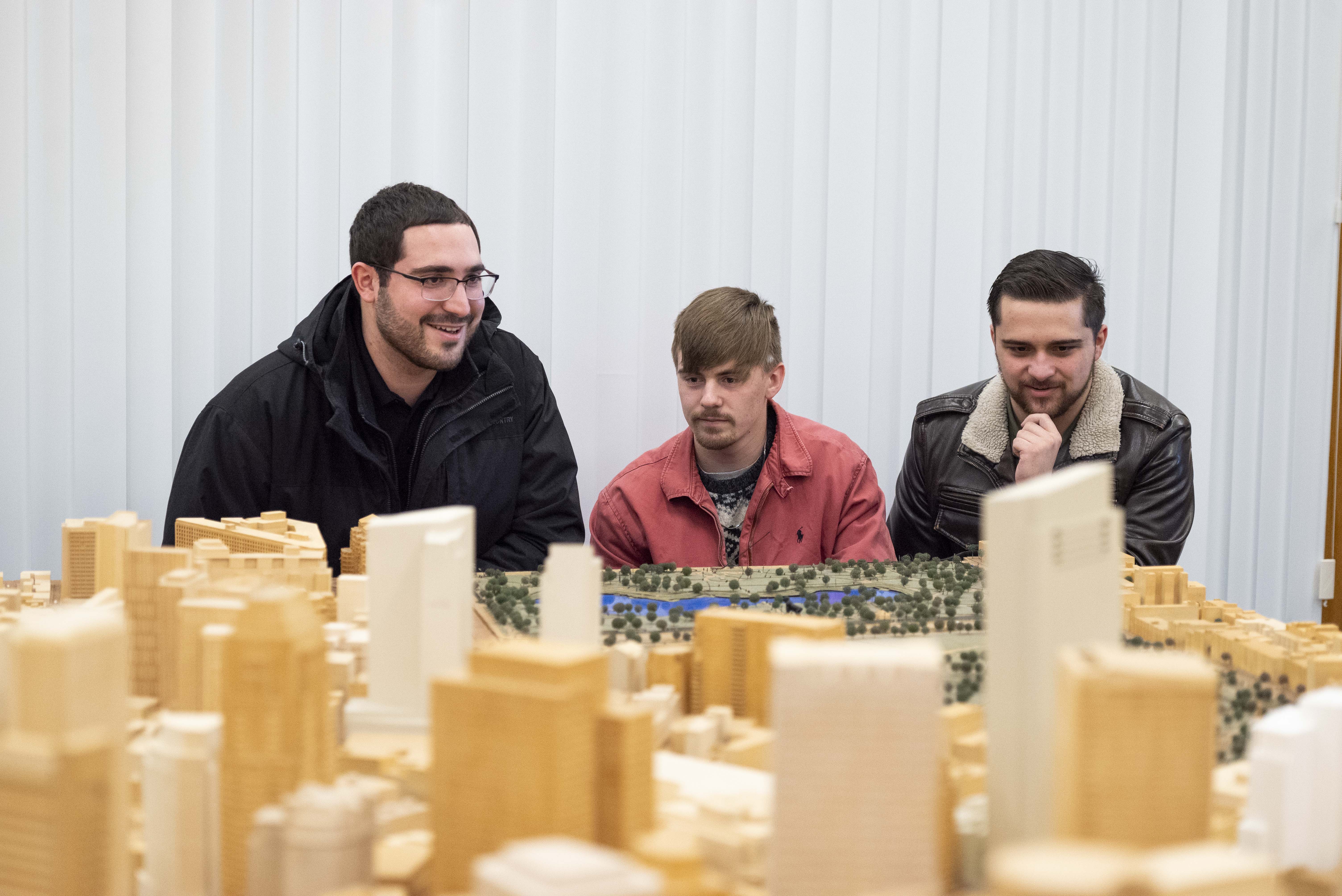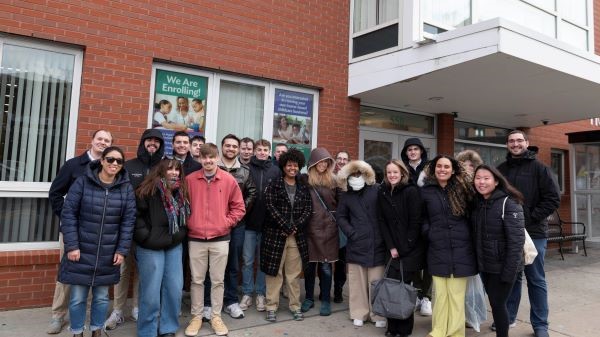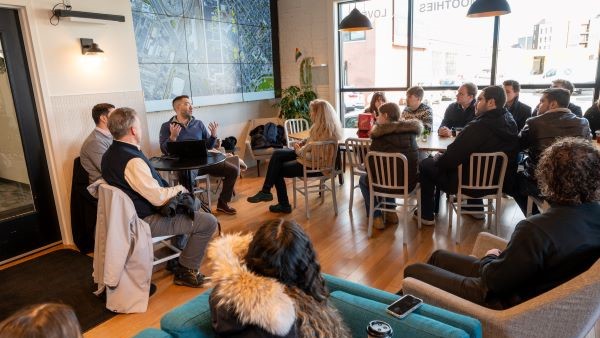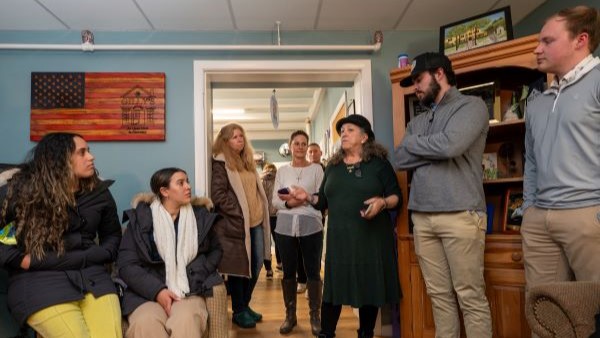It’s 8:30 on a chilly February morning and a group of Bryant students, alongside their College of Business faculty mentors, are scattered around the model room on the ninth floor of Boston City Hall for the first site of the IMPACT Boston field trip.
The massive space, part of the Boston Planning and Development Agency, is home to a 1:40-scale replica of more than two acres of the city, from Beacon Hill to the South Boston waterfront. Crafted from basswood, the sprawling 3D model is regularly updated and sports true-to-life details, from tiny elephants at the Franklin Park Zoo to the city’s infamous traffic.

It’s a wide-lens geographic introduction to the “sustainable community” theme of this annual IMPACT Boston trip. Management Lecturer Valerie Leduc and Finance Senior Lecturer Maura Ann Dowling designed this experience with input from student leaders from the Real Estate Association, the Women’s Network, and the Society of Human Resource Management. The purpose of IMPACT Boston is to explore and directly experience the impact of financial decisions on the health and sustainability of the whole community. Throughout the trip, professional speakers share observations and opportunities about what they’ve learned through long-term experience.
This 3D city model offers an orientation in urban development before the group moves on to the next stop: Dudley Neighbors, Inc. (DNI), which sits on the border between Roxbury and North Dorchester. As a Community Land Trust, DNI owns and leases properties, and is the steward for 98 permanently affordable homes, farm sites, parks, and commercial properties.
The speaker is Sharon Cho, DNI’s enthusiastic director. Cho describes how the Roxbury neighborhood is like a lot of working-class and immigrant communities that suffered from chronic disinvestment and redlining. In DNI’s case, however, the residents drafted a master plan in the 1980s to guide revitalization of the neighborhood, which allowed families to remain in affordable homes and not be displaced by gentrification.
“The market-driven model is destroying communities,” says Dowling. “We have to keep neighborhoods in the center of decision-making.”
Today, Roxbury is a thriving community with initiatives that range from street fairs and community gardens to land development. Cho illustrates these and other highlights on the walking tour of the Dudley Triangle neighborhood, pointing out a colorful “Unity through Diversity” street mural painted by artists and a lush greenhouse, managed by the Food Project. “It shows change can be made if you put energy into it,” Cho says.

It’s nearly noon, and the tour is already making an impression. “I’m so happy I came,” says Human Resource major Sarah Beachman ’25. “I especially liked Dudley and seeing how HR applies to that kind of project, and the importance of diversity and inclusion in making these projects successful.”
A half-mile walk later, lunch is served at Merengue Restaurant, a popular Dominican eatery on Blue Hills Avenue painted in cheerful Caribbean oranges and greens. Over fragrant dishes of Spanish rice, chicken, and pork, Karen Kelleher, president of the BlueHub Loan Fund, shares how she’s dedicated her career to improving underserved communities through lending and community development. Kelleher oversees more than $100 million in annual lending and manages $640 million in community development loans.
Before law school, she spent a year in Roxbury, a predominantly Black neighborhood, teaching low-income students. “It was incredibly challenging and rewarding,” Kelleher says. Then, while in law school, she saw a big difference in the opportunities available to her versus her students. “It just didn't sit well with me.” It motivated Kelleher to work in housing policy and shaped her mission to foster equity in her community. One insight she shared from her career: “When you’re in finance, you don’t always meet the people you help.”
Then, it’s on to Boston Common to learn about “The Embrace,” the city’s latest public art installation. The bronze, 20-foot sculpture celebrates Coretta Scott King and Martin Luther King, Jr. shortly after Dr. King won the Nobel Peace Prize in the wake of the successful Montgomery Bus Boycott. “The Embrace” was created by MASS Design Group, a Boston firm founded with the understanding that architecture plays a critical role in supporting communities and expanding access to design that is both healing and hopeful.

Washington Village in South Boston is the next stop. A modern, mixed-use community with an industrial vibe, the nearly five-acre site is being developed by Core Investments’ CEO David Pogorelc ’85, a Bryant alum. Pogorelc’s motto is “it’s a community, not a commodity” when working in existing neighborhoods as well as developing new ones. Architect and Senior Development Manager Art Campbell meets the group at the cozy Cannonball Cafe to share the history and wisdom learned from the years-long real estate development project.
“But how hard was it to buy all this land?” one student asks. “A nightmare,” Campbell replies. Some students are on their third IMPACT Boston visit and are noticing the changes that unfold each year. Other students are on their first visit. Campbell then takes the group for a walk around the community to see upcoming changes, fielding questions along the way.
As the group thanks Cannonball Cafe proprietor Rachel Lazar for her gracious hospitality, she shares that she is appreciative of Pogorelcs’ investment in her dream to open a cafe in this community.
An hour later, the bus pulls into Gilly’s House, where the group is welcomed by Founder and Executive Director Barbara Gillmeister. She informs the students of the conversion of the 15-year vacant nursing home into the homey nonprofit residential facility housing men in recovery. Gillmeister and her husband, David, launched Gilly’s House in Wrentham, Massachusetts, after the death of their son, Steven, from an overdose.

Gilly’s, located in a residential neighborhood, is staffed on-site 24 hours and the demands of fundraising are constant. After a pizza and taco dinner with Gilly’s House residents, a man who is 29 years into his recovery shared his story. It’s a thoughtful final stop on IMPACT Boston’s day-long journey.
This is the third year that Finance major Drew Dubois ‘24 has participated in the tour. “Each trip has been worthwhile because it gives a different perspective from what you usually get in class,” he says. “Profit isn’t just dollars and cents; it’s about reinvestment.”